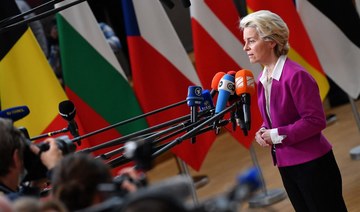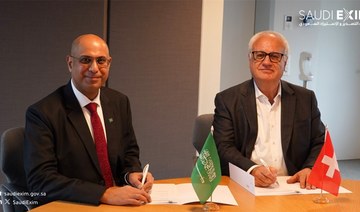RIYADH: Oil prices gained slightly on Wednesday after EU leaders agreed to a partial and phased ban on Russian oil and as China ended its COVID-19 lockdown in Shanghai.
Brent crude for August delivery was up 28 cents, or 0.2 percent, at $115.88 a barrel at 0338 GMT. The contract settled down 1.7 percent on Tuesday.
The front-month contract for July delivery expired on Tuesday at $122.84 a barrel, up 1 percent.
US West Texas Intermediate crude rose 30 cents, or 0.3 percent, to $114.97 a barrel.
Cenovus to resume Atlantic Canada oilfield project in 2023
Cenovus Energy and its partners said on Tuesday they will restart the West White Rose oilfield project off the coast of Atlantic Canada in 2023, more than two years after pausing it as the COVID-19 pandemic battered oil prices.
Major construction activities on the West White Rose project, which is expected to add 14 years of production to the White Rose oilfield, were suspended in April 2020. Since then oil prices have recovered and surged to a 13-year high in March.
The decision comes just weeks after the Canadian government approved Equinor ASA’s Bay du Nord deepwater project, also off the coast of Newfoundland and Labrador, and a major boost to the economy of the eastern province.
“With the project about 65 percent complete, combined with the work done over the past 16 months to firm up cost estimates and rework the project plan, we are confident in our decision to restart this project in 2023,” Cenovus CEO Alex Pourbaix said in a statement.
The Calgary-based company said the first oil from the platform is anticipated in the first half of 2026. Peak production is expected to be about 80,000 barrels per day by the end of 2029.
Shortage of oil refineries haunts Africa as fuel prices rocket
A shortage of oil refineries across sub-Saharan Africa coupled with soaring crude prices because of the war in Ukraine has left countries dangerously short of fuel supplies, disrupting airlines and causing queues at filling stations.
The surge in prices comes in tandem with a spike in the cost of food after Russia sent troops into Ukraine, hitting tens of millions of people already living in precarious conditions, as well as government and aid agency budgets.
Refineries across sub-Saharan Africa combined can process 1.36 million barrels of oil a day, in theory, but with many out of action, only 30 percent of that capacity was used last year, according to independent consultancy CITAC.
Refineries in Cameroon, Ghana and Senegal are shut, as are four in South Africa. Africa’s biggest oil producer, Nigeria, pumps over 1.3 million barrels a day, but the two privately-owned plants still running there can only process 1 percent of that.
Fuel shortages are also hitting Western nations, but the impact in Africa is expected to be long lasting as governments and companies are generally less able to afford the sky-high cost of imported fuel, or come up with the millions of dollars needed to get refineries running again at full tilt.
Moscow could re-route exports to limit its own losses: Kremlin
The Kremlin warned on Wednesday that the EU’s sanctions on Russian oil would hit the global energy market, but said Moscow could re-route exports to limit its own losses.
EU leaders this week agreed an embargo on Russian crude oil imports that aims to halt 90 percent of Russia’s oil sales into the 27-member bloc by year-end.
“These sanctions will have a negative impact on the entire continent — for Europeans, for us, and for the entire global energy market,” Kremlin spokesperson Dmitry Peskov told reporters.
(With input from Reuters)























